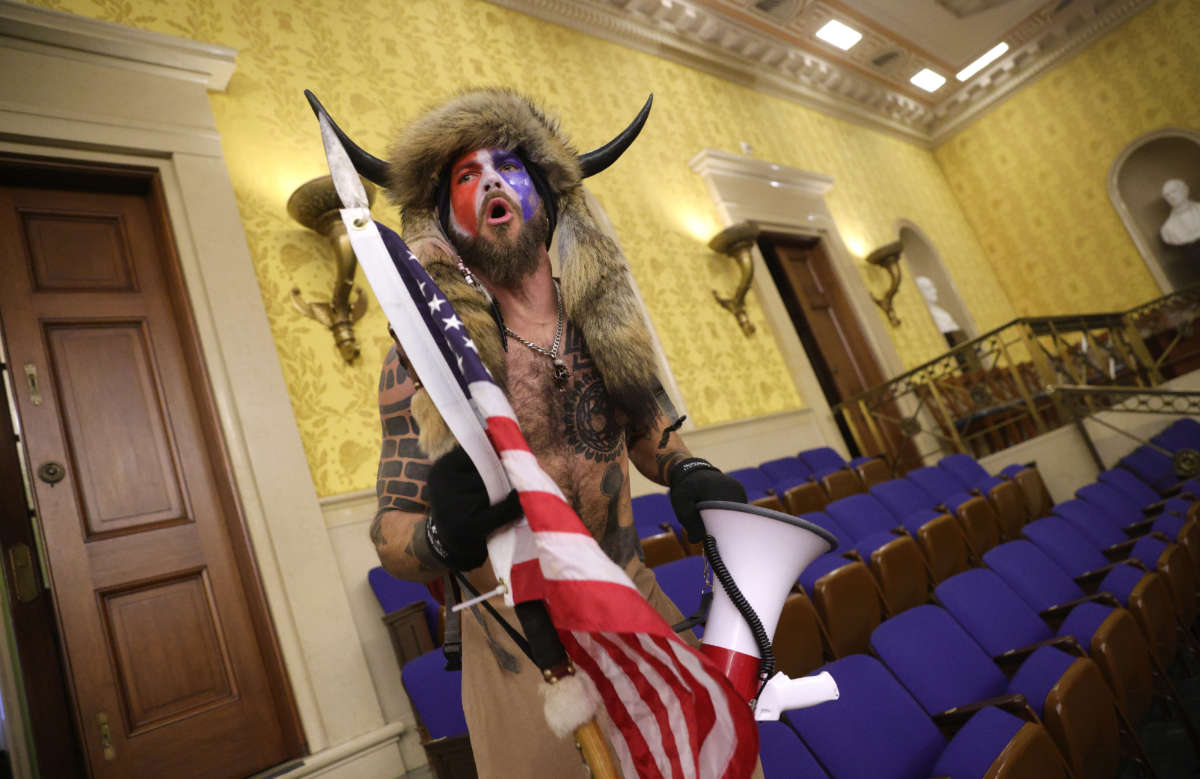The man who was seen during the storming of the Capitol building last week wearing fur, horns, and red, white and blue face paint, is seeking a pardon from President Donald Trump for criminal charges related to his role in the events, which led to the deaths of five people.
Jacob Anthony Chansley, who also uses the alias of Jake Angeli, faces several criminal charges, including knowingly entering or remaining in a restricted building or grounds without the legal authority to do so, as well as violent entry and disorderly conduct inside the Capitol.
A legal filing from the Department of Justice (DOJ) states that Chansley left a threatening note for Vice President Mike Pence while he was in the Capitol that day, which stated “it’s only a matter of time, justice is coming.”
“Strong evidence, including Chansley’s own words and actions at the Capitol, supports that the intent of the Capitol rioters was to capture and assassinate elected officials in the United States Government,” according to the filing. The DOJ also noted that Chansley was seen carrying a spear inside the Capitol during the attack.
Chansley’s attorney, Albert Watkins, believes that Trump should pardon him and others that took part in the breach because it was the president himself that invited them to Washington, D.C., for a protest rally, and encouraged them to go to the Capitol during a speech outside the White House.
Indeed, Trump had invited his loyalists to come to Washington, D.C., last month, tweeting on December 20 that the protest on January 6 would be “wild.” Trump incited his supporters to take action against lawmakers as they were certifying the election results, telling his loyalists to head to the Capitol, adding that they would “never take back our country with weakness.”
“My client had heard the oft-repeated words of President Trump,” Watkins said in a statement to The Washington Post. “The words and invitation of a president are supposed to mean something.”
Chansley turned himself in to police on Saturday, which Watkins suggested should encourage Trump to pardon his client.
“Given the peaceful and compliant fashion in which Mr. Chansley comported himself, it would be appropriate and honorable for the president to pardon Mr. Chansley and other like-minded, peaceful individuals who accepted the president’s invitation with honorable intentions,” Watkins said.
The U.S. Constitution provides the president with tremendous pardon powers that do not require direct oversight. Trump has often used that power to pardon or commute the sentences of his loyalists.
“It is now clear that for Trump, no matter what the crime — whether it is corruption, lying to law enforcement or even war crimes — justice does not apply to those who have been loyal to him,” Noah Bookbinder, a former DOJ criminal prosecutor and the current executive director for Citizens for Responsibility and Ethics in Washington, wrote in an opinion piece for USA Today last month. “We have one justice system for his predominantly rich, white and male friends and allies, and another for the rest of America.”
Trump is reportedly considering granting himself a pardon as well. While legal theorists continue to debate the matter, a legal memo from the Watergate era suggests he cannot.
“Under the fundamental rule that no one may be a judge in his own case, the President cannot pardon himself,” the memo stated.
Our most important fundraising appeal of the year
December is the most critical time of year for Truthout, because our nonprofit news is funded almost entirely by individual donations from readers like you. So before you navigate away, we ask that you take just a second to support Truthout with a tax-deductible donation.
This year is a little different. We are up against a far-reaching, wide-scale attack on press freedom coming from the Trump administration. 2025 was a year of frightening censorship, news industry corporate consolidation, and worsening financial conditions for progressive nonprofits across the board.
We can only resist Trump’s agenda by cultivating a strong base of support. The right-wing mediasphere is funded comfortably by billionaire owners and venture capitalist philanthropists. At Truthout, we have you.
We’ve set an ambitious target for our year-end campaign — a goal of $230,000 to keep up our fight against authoritarianism in 2026. Please take a meaningful action in this fight: make a one-time or monthly donation to Truthout before December 31. If you have the means, please dig deep.
